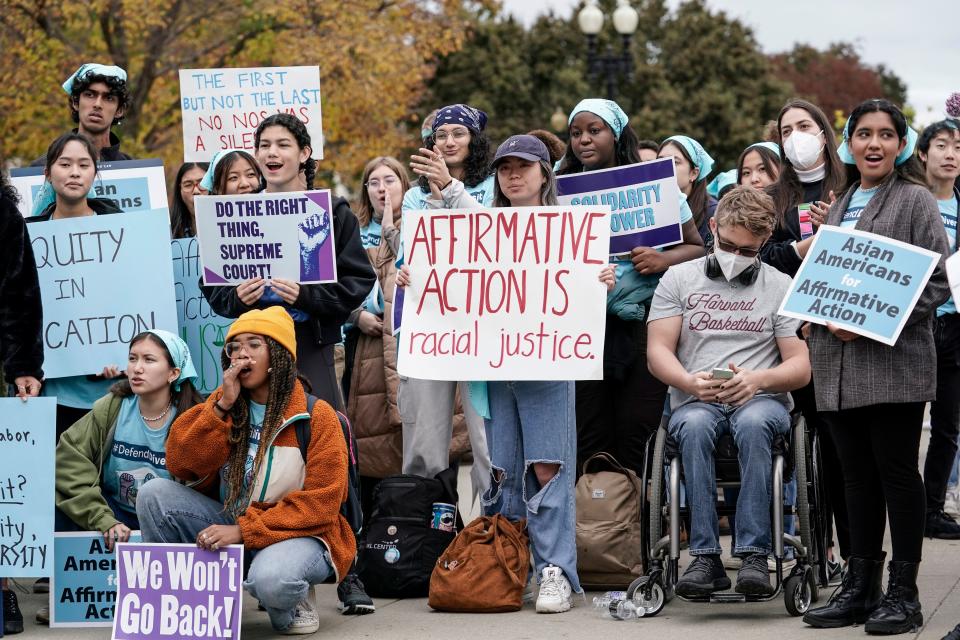Supreme Court ends affirmative action in admissions. Colleges will be whiter for it.
Last term, in overturning Roe v. Wade, the Supreme Court erased a half-century of legal precedent, and with it our agency over our lives and futures, particularly affecting communities of color.
Now, after 45 years of precedent, the Supreme Court has decided two more cases – Students for Fair Admissions v. President and Fellows of Harvard, and Students for Fair Admissions v. University of North Carolina – that will greatly influence our potential to thrive as a multiracial democracy.
By restricting a university's ability to select its student body in these rulings, the Supreme Court has determined that it is unconstitutional for colleges and universities across the country to consider a student’s race as one factor in a holistic admissions review process.
It is critical to note, however, that in the opinion by Chief Justice John Roberts the court emphasized that “nothing in this opinion should be construed as prohibiting universities from considering an applicant's discussion of how race affected his or her life, be it through discrimination, inspiration, or otherwise."

With this statement, the court recognizes that the values of diversity are “commendable goals,” and that schools can consider applicants’ own discussion of how race has impacted their lives.
Universities can and should still examine, improve and create policies and practices to expand opportunity. It is more important now than ever that colleges broaden recruitment efforts to underserved communities, develop robust middle school and high school pipelines, increase need-based supports and improve campus climate.
Colleges and universities have long touted the importance of a diverse student body – now is the time for our institutions to double down on that goal.
Students can also continue to discuss race and identity – they should continue to uplift their lived experience in the college admissions process. Thursday's decisions do not stop that expression and should not prevent colleges and universities from inquiring about such experiences that lend well to their university missions.
While I caution people from overstating the ripple effects of Thursday’s ruling and using language that discourages students of color from applying, we must use this moment to continue to state out loud that affirmative action or race-conscious admissions policies have helped address our country’s long history of discrimination and systemic inequality by increasing access to higher education for underrepresented racial and ethnic groups who face systemic barriers.
Opponents of race-conscious admissions have argued that taking race into account is unconstitutional regardless of the motivation or circumstances. Some have advanced the argument that remedial preferences are no longer needed because America has moved beyond racist policies of the past, such as segregation, and is becoming increasingly diverse.
Another view: Supreme Court rules to end affirmative action, moving US in the right direction
Ignoring race does not make reality of racial inequality go away
Pushing us into this colorblind paradigm will do real damage and set us back in a world that is undeniably shaped by race. Ignoring race does not make the reality of racial inequality go away, just as prohibiting teaching about racial inequality won’t erase our history.
Race continues to constrain opportunities and life outcomes for some, and expand opportunities and outcomes for others. Colorblindness will only exacerbate racial injustice and delay the vital work of grappling with the way race shapes access to opportunities.
We also must remember that current conceptions of merit are not colorblind. Take college admission exams, for example. Statistically, students of color score lower than white students on standardized tests. Family income can impact a student's ability to afford tutoring support, purchase practice tests and study books, and pay to take standardized tests multiple times.
These preparatory resources play a major role in how students perform on standardized tests. Families of color average lower incomes than white families, highlighting the racial wealth gap that further impacts standardized testing scores.
Opinion alerts: Get columns from your favorite columnists + expert analysis on top issues, delivered straight to your device through the USA TODAY app. Don't have the app? Download it for free from your app store.
SCOTUS ruling shouldn't reclaim higher education for white people
As we strive for a world with greater racial equity, there’s a counterforce fighting to resist progress. Affirmative action originated from movements seeking to desegregate historically and predominantly white spaces.
Critics of affirmative action are wrong: Affirmative action is not and has never been a zero-sum game in college admissions
The efforts to challenge race-conscious admissions are part of a movement to reclaim those spaces for white people. The dismantling of affirmative action represents just one piece of a larger agenda to erase and rewrite our nation’s history. Opponents of affirmative action are the same people trying to ban books by Black and LGBTQ+ authors from school curricula, to forcibly displace Native children from their families and to disenfranchise millions of Black and poor people through racial gerrymandering.
As Justice Ruth Bader Ginsburg wrote in her scathing dissent of Shelby v. Holder, the Supreme Court overturning affirmative action is akin to “throwing away your umbrella in a rainstorm because you are not getting wet.”
Students deserve equal access to high quality education, safe learning environments and diverse student bodies. The court had a responsibility to follow precedent and keep the proverbial umbrella open. And in failing to do so, we must continue to fight to protect the historic gains our country has made in promoting and preserving opportunity.

Deborah Archer is the president of the ACLU, professor of Clinical Law and director of the Civil Rights and Racial Justice Clinic at New York University School of Law.
You can read diverse opinions from our Board of Contributors and other writers on the Opinion front page, on Twitter @usatodayopinion and in our daily Opinion newsletter. To respond to a column, submit a comment to letters@usatoday.com.
This article originally appeared on USA TODAY: Supreme Court affirmative action decision fails students of color

